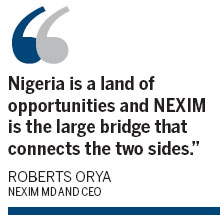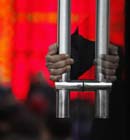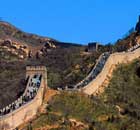News
China-Nigeria trade ties continue to strengthen
(China Daily)
Updated: 2010-03-23 08:07
 |
Large Medium Small |
Demand for goods, machinery and more makes nation the second-largest African partner
The world's eighth-largest oil and gas exporter, Nigeria's socioeconomic development is being fueled by massive Chinese investment in key sectors such as energy, financial services, manufacturing, and technology.
With Africa's most populous country embracing privatization and economic diversification, Chinese enterprises are flooding in and taking advantage of the numerous foreign direct investment (FDI) opportunities.
While Nigeria's oil and gas industry is the main FDI destination, Chinese firms also have a solid presence in the construction, agriculture, education, and service sectors. Chinese investment in Nigeria is now worth an estimated $6 billion.

Increasing demand among Nigeria's 150 million citizens for Chinese-made goods such as motorbikes, textiles and machinery has resulted in the country becoming China's second-largest African trade partner behind South Africa.
The successful strategic partnership based on China's valuable skills, knowledge, and experience is set to strengthen over the next decade as Nigeria looks to achieve its infrastructural, economic and social goals under a development plan it calls Vision 2020.
Charged with regulating the banking sector and managing the nation's macroeconomic policies, the Central Bank of Nigeria (CBN) has evolved from a government organization into an independent central bank.
Since 1999, the central bank has overseen major reforms in the financial services sector such as the privatization of government enterprises and a series of consolidations and acquisitions.
"It is in Nigeria's interests to diversify the economy and sources of capital and I would like us to enjoy strong relations with banks in Asia and the Middle East," said CBN governor, Sanusi Lamido Aminu Sanusi.
"The market needs a combination of indigenous and foreign financial institutions as this increases competition, raises standards and improves the quality of the system."
By focusing attention on good governance, transparency, and risk management, CBN is building trust in the nation's financial system and helping prepare domestic banks for foreign expansion and global mergers and acquisitions.
"We expect to see significant amounts of capital from China flowing into the construction and oil sectors, with banks trapping these flows," Sanusi says.
A pioneering player in Africa's financial services sector, Stanbic IBTC Bank Plc was established three years ago through the merger of Stanbic Bank Nigeria and industry giant IBTC Chartered Bank Plc.
The bank offers a range of corporate, investment, business and personal banking products and is regularly working on major capital market deals. Ties between the group and the Industrial and Commercial Bank of China (ICBC) were strengthened through last year's visit of ICBC chairman, Jiang Jianqing, to its Stanbic offices.
"Nigeria has great potential throughout every sector. Reliability, trust and transparency are highly important in financial sector operations," said Chris Newson, Stanbic IBTC Bank Plc CEO.
"The successful visit of Jiang Jianqing was a very important step for us as our aim was to showcase Nigeria and create an understanding of how the country functions. We believe in Nigeria and that is why we have invested more than $600 million here as we see the long-term potential."

Founded 19 years ago, the Nigerian Export-Import Bank (NEXIM) is at the core of the country's trade-oriented activities through the provision of loans to exporters. The bank provides short-term guarantees for loans granted by Nigerian banks to exporters, and offers credit insurance against the event of non-payment by foreign buyers.
The government-owned bank has extended its reach to China through high-level talks and deals with Chinese financial institutions such as the Export-Import Bank of China.
"We were looking for international partners and the first one we saw was China Eximbank," said Roberts Orya, NEXIM MD and CEO.
"We visited China to identify areas of cooperation and want to strengthen our relationship with the appropriate banking institutions there."
Orya expects NEXIM to sign memorandums of understanding in order to boost bilateral trade deals.
"Nigeria is a land of opportunities and NEXIM is the large bridge that connects the two sides," he added. "China has huge business potential and when our clients tell us they plan to buy heavy equipment, we always advise them to buy Chinese-made machinery as the quality is excellent and the price very reasonable."
When entrepreneur M.L. Asnani joined forces with the Shanghai Light Industry Co Ltd to bring the Butterfly brand sewing machine to Nigeria in 1988, he may not have guessed that three decades on, the family business would be a huge conglomerate.
Now responsible for equipping millions of Nigerian homes, farms and offices with affordable goods, Emel is a Nigerian success story, with an ever-growing list of partners and subsidiaries, and a product range that covers everything from suitcases to cars.
"We've come a long way from our first manufacturing order, which was 20,000 sewing machines a year," says Naresh Emel Asnani, son of M.L. Asnani and the company's managing director and CEO. "After the business really took off (after 1993) we saw growth rising over 8 times its previous size, and we captured 70-80 percent of the market-and that was in sewing machines alone."
According to Asnani Jnr, the key to the Lagos-based firm's success has been cooperation and synergy with Mr Ma, director of China Unity. "He has the product knowledge and represents the partners, while I have the relationship building skills, business knowledge, and an ability to recruit the necessary partners and employees.
"We have grown strong, and successfully, for 10 years, without any problems touching the business. We have taken part in more joint ventures, which has led to an increase in manufacturing.
"The cornerstone is that I am a trader. I know Nigeria, I know how to bring good here, and I know how to sell them."
Of course, Asnani also knows how to spot an opportunity. Living in a country that has some 150 million people spread out in all its corners, he and his team identified the need for reliable vehicles that could transport passengers and goods around cheaply. They partnered with Beijing Automobile Works Co Ltd, one of the pioneers of the Chinese automobile industry, to distribute minibuses and lightweight trucks. The company stays close to the customers, Asnani says "by exceeding their expectations and providing an excellent nationwide after-sales service."
Emel is now looking into generators, medical supplies, pharmaceuticals, building materials, and even automobile rental, based on the Beijing Automobile World model.
"Even though these developments are at an early stage, it is my belief that Chinese and Nigerian business links have to develop further," Asnani says." Chinese products are suitable for the Nigerian market, their labor-intensive industries and product pricing are right, and Nigeria's development has to follow the same path as China and India."
And, to ensure Emel's trusted reputation stays intact, Asnani has been careful not to compromise on quality. "Price alone is not the right tactic for identifying partners," he says. "We have always found Chinese companies that give us the right quality/price balance. Our expertise assures that our products stand up under scrutiny and do not disappoint the customers."
In the same way, Asnani's local knowledge ensures only the best distributors are used back on Nigerian soil. "We have to push for innovation, as local distributors can see little advantage in changing habits," he says. "This is exactly why local knowledge is important, and knowing how to deal with the national business community."



(China Daily 03/23/2010 page18)







